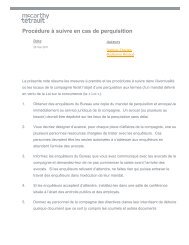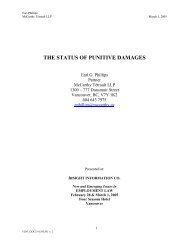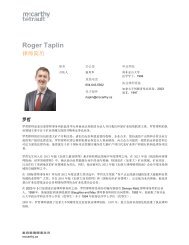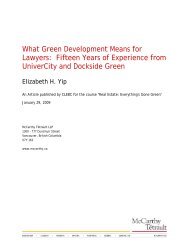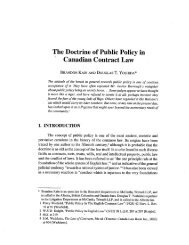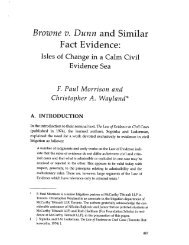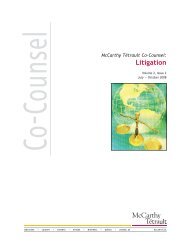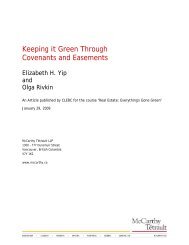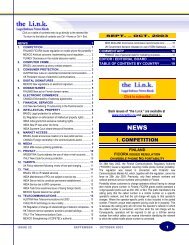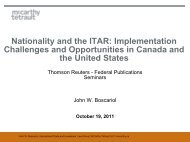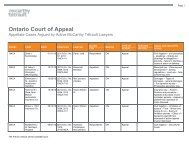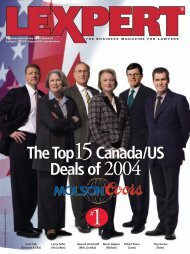Presentation Material - McCarthy Tétrault
Presentation Material - McCarthy Tétrault
Presentation Material - McCarthy Tétrault
You also want an ePaper? Increase the reach of your titles
YUMPU automatically turns print PDFs into web optimized ePapers that Google loves.
Chris Falk<br />
Stefanie Morand<br />
<strong>McCarthy</strong> Tétrault LLP<br />
In the view of the authors, the language and clear policy of section 84.1 permit pipeline<br />
transactions, provided that the aggregate of the FMV of the non-share consideration and of the<br />
increase in PUC of the shares of the purchaser corporation does not exceed the Hard ACB of<br />
the shares of the transferee corporation.<br />
For purposes of section 84.1, ACB is generally reduced in respect of both pre-1972 gains and<br />
capital gains exemptions claimed on the share (or a share for which the share was substituted)<br />
of the taxpayer or a person with whom the taxpayer did not deal at arm’s length. In the pipeline<br />
transaction contemplated in the example above, provided that pre-1972 gains and capital gains<br />
exemption claims are not in issue, section 84.1 would appear to be intended to permit the form<br />
of surplus stripping contemplated (i.e., where the estate has “Hard ACB” by reason of the<br />
deemed disposition on death).<br />
Subsection 88(1) governs the winding-up of XCo into Newco in the example contemplated. On<br />
such a wind-up, paragraph 88(1)(d.1) provides that subsection 84(2) does “not apply to the<br />
winding-up of the subsidiary”.<br />
In light of the above provisions, the CRA’s position that subsection 84(2) may apply in respect of<br />
a basic pipeline appears to be doubtful in the example contemplated for the following reasons:<br />
• Subsection 84(2) is expressly made inapplicable to the winding-up of XCo into Newco by<br />
reason of paragraph 88(1)(d.1).<br />
• On its face, subsection 84(2) applies to distributions or appropriations “to or for the<br />
benefit of the shareholders […] on the winding-up” of XCo. On the winding-up of XCo,<br />
XCo’s sole shareholder is Newco (and subsection 84(2) should not apply to deem there<br />
to be a dividend triggered on the winding-up of Newco into the estate to the extent that<br />
$100,000 is paid on the note rather than on the Newco shares). 32<br />
• The provisions of section 84.1, which govern transactions of the type contemplated in a<br />
basic pipeline, permit the extraction of “Hard ACB” such as the estate’s ACB in the XCo<br />
shares.<br />
• Where the Act has deemed there to be a disposition at FMV by reason of a taxpayer’s<br />
death, particularly given the provisions of section 84.1, in the authors’ view, at least in<br />
the ordinary course, the estate should not be regarded as an “accommodation party” that<br />
has been inappropriately used to extract corporate assets. Therefore, GAAR should not<br />
normally be engaged.<br />
• Further, subsection 84(2) can apply only where assets have been distributed or<br />
appropriated “on the winding-up, discontinuance or reorganization of [… XCo’s]<br />
business”. Accordingly, where XCo is not carrying on a business (and, if it was formerly<br />
carrying on a business, where the distribution does not occur on the winding-up,<br />
32<br />
It is acknowledged that some jurisprudence has taken a broad view of this aspect of subsection 84(2) (see, for<br />
example, RMM Canadian Enterprises Inc. et al v. The Queen, 97 DTC 302 (TCC) [“RMM”], but see also Collins<br />
& Aikman Products Co. et al v. The Queen, 2009 DTC 1179 (TCC), affirmed 2010 DTC 5164 (FCA)).<br />
560600/422632<br />
MT DOCS 11864055v1G<br />
9



